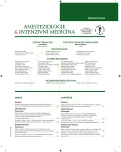-
Články
- Vzdělávání
- Časopisy
Top články
Nové číslo
- Témata
- Kongresy
- Videa
- Podcasty
Nové podcasty
Reklama- Kariéra
Doporučené pozice
Reklama- Praxe
Echocardiographic evaluation of the aortic valve in the unstable patient – basic considerations
Authors: R. Šachl; M. Dobiáš; J. Kunstýř
Authors place of work: Klinika anesteziologie, resuscitace a intenzivní medicíny 1. LF UK a Všeobecná fakultní nemocnice, Praha
Published in the journal: Anest. intenziv. Med., 26, 2015, č. 6, s. 350-354
Category: Echodidaktika - postgraduální vzdělávání
Summary
The aortic valve assessment is a part of complex echocardiographic examination for a compensated patient however especially for a haemodynamically unstable patient. In these conditions we need to rule out or confirm decompensated severe aortic stenosis, aortic regurgitation, infective endocarditis or other pathology of native or prosthetic valve. The pathology of aortic valve is a common cause of heart failure and therfore early echocardiographic assessment allows fast and correct decision in a care of an unstabil patient.
Authors of the paper get to know the anesthesiologists and intensivists the fundamental principles of assessment of the aortic valve especially in condition of intesive care.Keywords:
echocardiography – aortic stenosis – aortic regurgitation – continuous wave doppler – colour flow doppler – M-mode
Zdroje
1. Linhart, A., Paleček, T., Aschermann, M. Echokardiografie pro praxi. Audioscan, spol. s.r.o., 2002.
2. Oh, J. K., Seward, J. B., Tajik, A. J. The Echo Manual. Third edition, Lippincott Williams & Wilkins, 2007.
3. Cor Vasa, 49 (6), K157-K171, 2007.
4. Sidebotham, D., Merry, A., Legget, M. Practical Perioperative Transoesophagial Echocardiography. Butterworth-Heinemann, 2008.
5. Harmon, D., Frizelle, H., Sandhu, N. S., Colreavy, F., Griffin, M. Perioperative Diagnostic and Interventional Ultrasound. Saunders Elsevier, 2008.
6. Böhmeke, T., Schmidt, A. Echokardiografie. Grada, 2009
7. Kaddoura, S. Echo Made Easy. Second edition, Churchill Livingstone Elsevier, 2009.
8. Feneck, R., Kneeshaw, J., Ranucci, M. Core Topics in Transaoesophagial Echocardiography. Cambridge University Press, 2010.
Štítky
Anesteziologie a resuscitace Intenzivní medicína
Článek vyšel v časopiseAnesteziologie a intenzivní medicína
Nejčtenější tento týden
2015 Číslo 6- Metamizol v léčbě různých bolestivých stavů – kazuistiky
- Neodolpasse je bezpečný přípravek v krátkodobé léčbě bolesti
- Jak souvisí postcovidový syndrom s poškozením mozku?
- Perorální antivirotika jako vysoce efektivní nástroj prevence hospitalizací kvůli COVID-19 − otázky a odpovědi pro praxi
- Léčba akutní pooperační bolesti z pohledu ortopeda
-
Všechny články tohoto čísla
- Nozokomiální pneumonie ventilovaných nemocných – je skutečně nevyhnutelnou komplikací umělé plicní ventilace?
- Vplyv profylaktického podávania melatonínu na výskyt včasného pooperačného delíria u kardiochirurgických pacientov
- Můžeme pouhou změnou premedikace dosáhnout snížení výskytu delirantního stavu u dětí po operaci?
- Rýchla diferenciálna diagnostika akútnej respiračnej insuficiencie pomocou ultrasonografie pľúc
- Vliv zavádění balíčků preventivních opatření na výskyt ventilátorových pneumonií
- Echokardiografické zhodnocení aortální chlopně u nestabilního pacienta – základní vyšetření
- Zajištění dýchacích cest
- Pacienti s rezavými vlasy mají vyšší výskyt komplikací – mýtus nebo důkazy?
- Stanovisko ke kalkulaci mozkového perfuzního tlaku u pacientů s traumatickým poraněním mozku
- Anesteziolog jako ochránce pacienta aneb čeká nás „povinnost donášet“ na naše kolegy?
-
XVI. kardioanesteziologické vědecké dny s mezinárodní účastí
Vybrané souhrny přednášek - Výborová schůze ČSARIM
- Zápis z jednání výboru č. 4/2015
- Rejstříky
- Anesteziologie a intenzivní medicína
- Archiv čísel
- Aktuální číslo
- Informace o časopisu
Nejčtenější v tomto čísle- Echokardiografické zhodnocení aortální chlopně u nestabilního pacienta – základní vyšetření
- Rýchla diferenciálna diagnostika akútnej respiračnej insuficiencie pomocou ultrasonografie pľúc
- Můžeme pouhou změnou premedikace dosáhnout snížení výskytu delirantního stavu u dětí po operaci?
- Zajištění dýchacích cest
Kurzy
Zvyšte si kvalifikaci online z pohodlí domova
Autoři: prof. MUDr. Vladimír Palička, CSc., Dr.h.c., doc. MUDr. Václav Vyskočil, Ph.D., MUDr. Petr Kasalický, CSc., MUDr. Jan Rosa, Ing. Pavel Havlík, Ing. Jan Adam, Hana Hejnová, DiS., Jana Křenková
Autoři: MUDr. Irena Krčmová, CSc.
Autoři: MDDr. Eleonóra Ivančová, PhD., MHA
Autoři: prof. MUDr. Eva Kubala Havrdová, DrSc.
Všechny kurzyPřihlášení#ADS_BOTTOM_SCRIPTS#Zapomenuté hesloZadejte e-mailovou adresu, se kterou jste vytvářel(a) účet, budou Vám na ni zaslány informace k nastavení nového hesla.
- Vzdělávání



